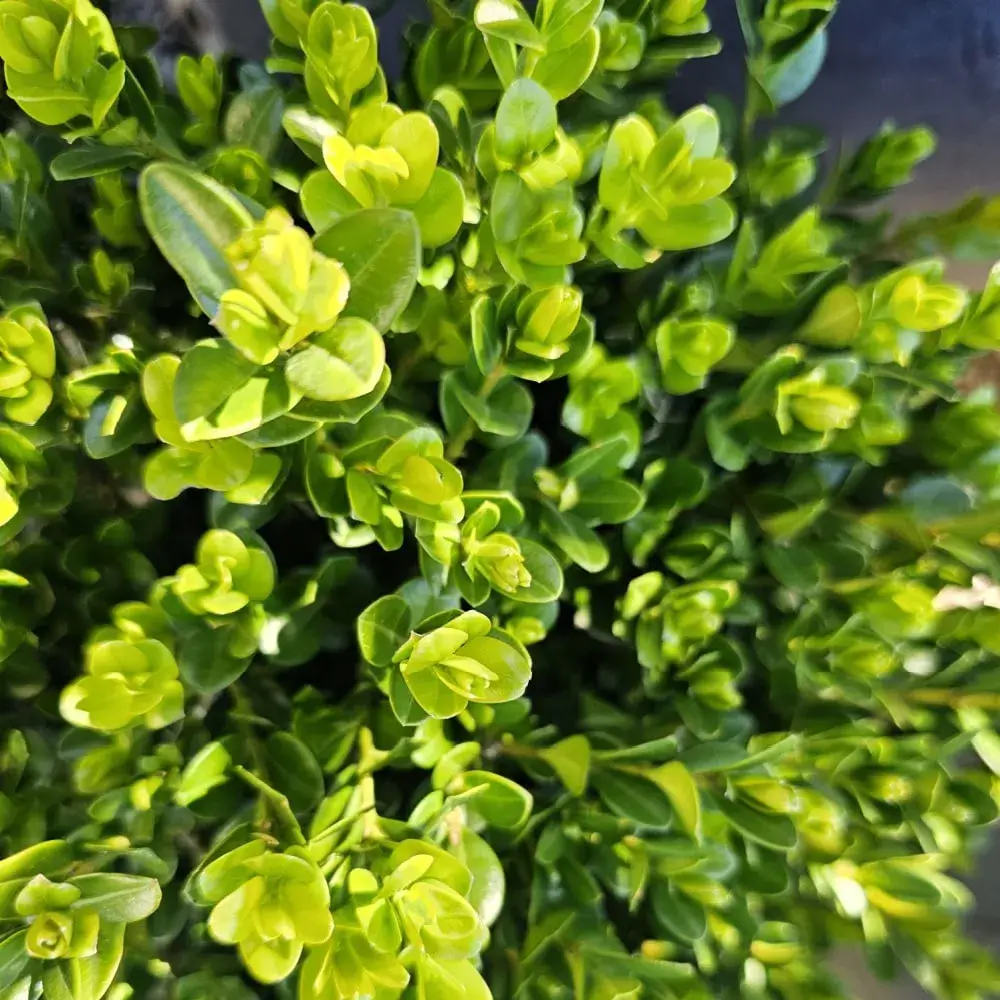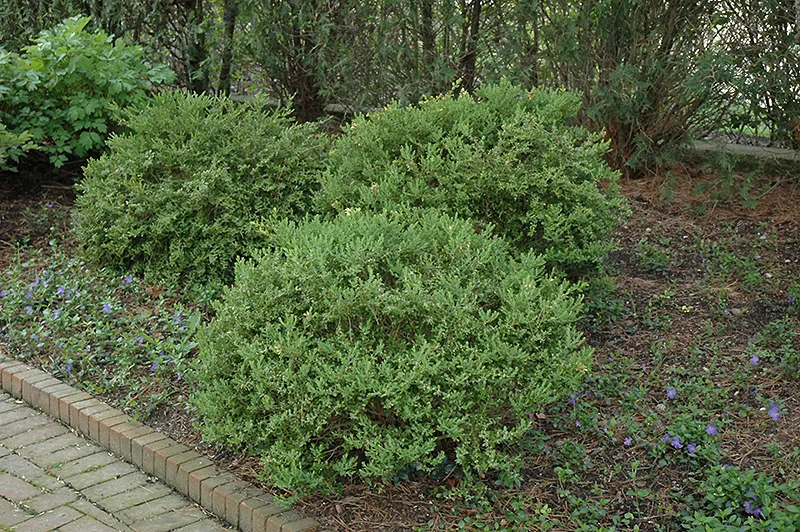Family: Boxwood
Type: Shrub
Other Common Name: Littleleaf Box, Korean Boxwood

Wintergreen Boxwood is a popular evergreen shrub known for its vibrant green foliage and versatile nature. It’s a go-to choice for gardeners and landscapers due to its hardy and adaptable characteristics. This plant thrives in a variety of climates, making it a reliable choice for many gardens.
Its dense, compact growth habit allows for easy shaping and maintenance, making it ideal for both formal and informal garden designs. The Wintergreen Boxwood is especially favored for creating hedges, borders, and topiaries. Its ability to withstand frequent trimming and shaping contributes to its popularity in landscape design.
This evergreen shrub not only adds year-round color to your garden but also serves as a natural privacy screen. Its resistance to deer and pests, coupled with its tolerance to different soil types, makes it a hassle-free addition to any outdoor space.
Hardiness Zone: 4a-9a
Deer Resistant: Yes
Pet Friendly: Yes
Moisture Preference: Average to moist
Sun Needs: Full sun to partial shade
Growth Rate: Slow
Average Height (feet): 3
Average Spread (feet): 3
Average Life Span (years): 30
Form: Round
Foliage Color: Green
Foliage Shape: Round
Integrating Wintergreen Boxwood into your yard enhances the overall aesthetic with its lush, green appearance. Its versatility makes it suitable for various landscaping styles, from formal gardens to casual settings.
These shrubs can be planted individually as focal points or grouped to form hedges and borders. Their ability to be shaped allows for creative topiary designs, adding a unique touch to your garden.
Using Wintergreen Boxwood in foundation plantings provides a neat, structured look to your home’s exterior. Their evergreen nature ensures that your yard remains vibrant and lively throughout the year.

In formal garden designs, Wintergreen Boxwood plays a crucial role. Its ability to be precisely trimmed suits the symmetrical and geometric layouts of these gardens. Typically used in parterres or hedge mazes, it adds a sense of elegance and order.
For a cottage garden style, Wintergreen Boxwood adds structure to an otherwise free-flowing and whimsical space. It serves as a backdrop for colorful perennial flowers, highlighting their natural beauty and creating a harmonious balance.
In contemporary landscape designs, the clean lines and minimalist approach of Wintergreen Boxwood are ideal. It complements modern architectural elements and is often used in sleek, linear plantings or as sculptural focal points.
Create a stunning border by planting a row of Wintergreen Boxwood along walkways or garden paths. Their neat appearance provides a crisp, clean edge to your landscape design.
Mix Wintergreen Boxwood with flowering plants for a vibrant contrast. The evergreen foliage serves as a perfect backdrop, making the colors of the flowers pop.
For a low-maintenance garden, use Wintergreen Boxwood as the primary plant. Its slow growth rate and easy upkeep make it a practical choice for busy gardeners.
Select our pre-made garden layouts to create a landscape that’s uniquely yours. Simple, smart, and customizable!
In spring, the Wintergreen Boxwood bursts into new growth, displaying bright green leaves. This rejuvenation adds a fresh and lively look to your garden, symbolizing the awakening of nature.
During summer, the foliage of Wintergreen Boxwood deepens into a rich green, providing a lush backdrop to summer blooms. Its dense foliage offers cool, shaded spots in the garden.
As fall arrives, Wintergreen Boxwood maintains its deep green color, standing out against the changing autumn colors. It offers a constant visual anchor in a season of transformation.
In winter, the Wintergreen Boxwood remains green, bringing much-needed color to the otherwise dormant landscape. Its resilience to cold and snow makes it a standout feature in winter gardens.
Pulmonaria
Hosta 'Patriot'
Athyrium Nippocum 'Pictum'
Wintergreen Boxwood thrives in areas with partial to full sunlight exposure. Ideal locations are those that receive morning sun and afternoon shade, providing a balanced environment for growth. Avoid planting in heavily shaded areas, as this can impede growth.
These shrubs prefer a balance of sun and shade. They perform best in locations with at least four to six hours of direct sunlight per day, followed by partial shade. Too much sun can lead to leaf scorch, while too little can cause sparse growth.
Wintergreen Boxwood is adaptable to a range of soil types but flourishes in well-drained, loamy soil. Ensure the soil is slightly acidic to neutral for optimal growth. Poor drainage can lead to root rot, so avoid overly wet areas.
When planting Wintergreen Boxwood, allow a distance of about 2 to 3 feet between each shrub. This spacing accommodates their growth and ensures adequate air circulation, which is vital for preventing fungal diseases.
The best time to plant Wintergreen Boxwood is during the cooler months of spring or fall. Planting in mild weather allows the shrubs to establish roots without the stress of extreme temperatures, either hot or cold.
Dig a hole as deep as the root ball and twice as wide. Place the plant in the hole, ensuring it’s level with the ground. Fill the hole with soil, tamp gently, and water thoroughly. Mulching around the base can help retain moisture and regulate soil temperature.
Regular watering is crucial, especially for newly planted shrubs. Water deeply once a week, allowing the soil to dry out slightly between waterings. Established plants are more drought-tolerant but still benefit from consistent moisture.
Fertilize Wintergreen Boxwood in early spring with a balanced, slow-release fertilizer. Avoid over-fertilizing, as this can lead to excessive growth, making the plants more susceptible to damage in winter.
Prune in late winter or early spring before new growth starts. Pruning helps maintain shape and promotes dense growth. Remove any dead or damaged branches to keep the plant healthy.
In spring, apply a fresh layer of mulch and a balanced fertilizer to encourage vigorous growth. Monitor water needs as the weather warms up, ensuring the soil remains moist but not waterlogged.
During summer, maintain consistent watering, especially in periods of drought. Monitor for pest infestations or diseases and treat accordingly. Pruning is not recommended in summer as it can expose new growth to harsh sun.
Prepare Wintergreen Boxwood for winter by reducing watering and stopping fertilization. A light pruning may be done to shape the shrubs, but avoid heavy trimming that stimulates new growth.
In winter, protect the plants from extreme cold and drying winds with burlap screens if necessary. Avoid over-watering but ensure the soil doesn’t completely dry out. Pruning is not recommended in winter.
Buxus microphylla 'Morris Dwarf'
Buxus x 'Green Mountain'
Buxus Microphylla 'Winter Gem'
Wintergreen Boxwoods are slow-growing shrubs, typically growing about 3-6 inches per year. Their growth rate can be influenced by factors like sunlight, soil quality, and overall care.
While Wintergreen Boxwood can tolerate partial shade, it thrives best in locations with a balance of sun and shade. Too much shade can lead to sparse, leggy growth.
Yes, Wintergreen Boxwoods are considered deer resistant. Their dense foliage and aromatic leaves are generally unappealing to deer, making them a great choice for gardens in areas with high deer populations.
Sign up below to get exclusive deals, discounts, and new plant collections—delivered straight to your inbox! Plus, stay inspired with the latest gardening tips, landscaping trends, and DIY garden ideas. Start growing with us today!
A big thank you for subscribing to the PBN Design newsletter.
We're thrilled to have you join our community. Get ready for exciting updates, insightful content, and more delivered straight to your inbox.
Stay tuned!
Go backA big thank you for subscribing to the PBN Design newsletter.
We're thrilled to have you join our community. Get ready for exciting updates, insightful content, and more delivered straight to your inbox.
Stay tuned!
Go back